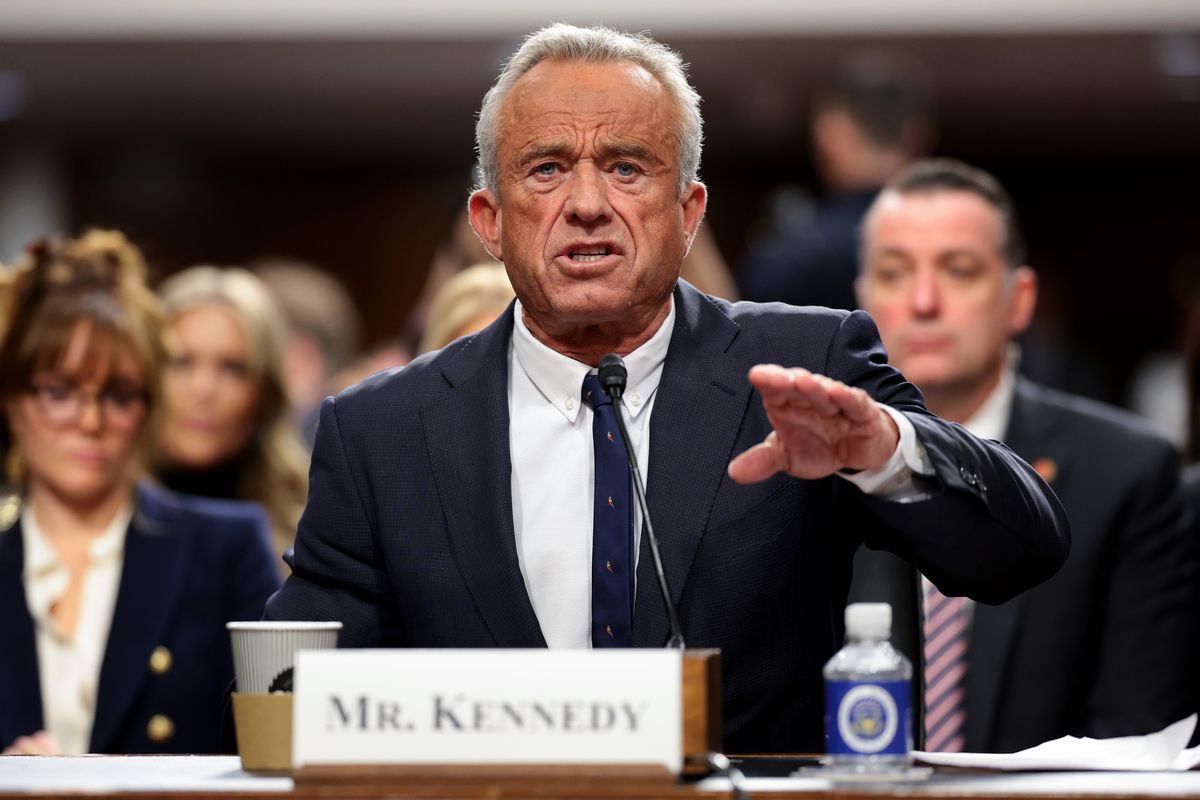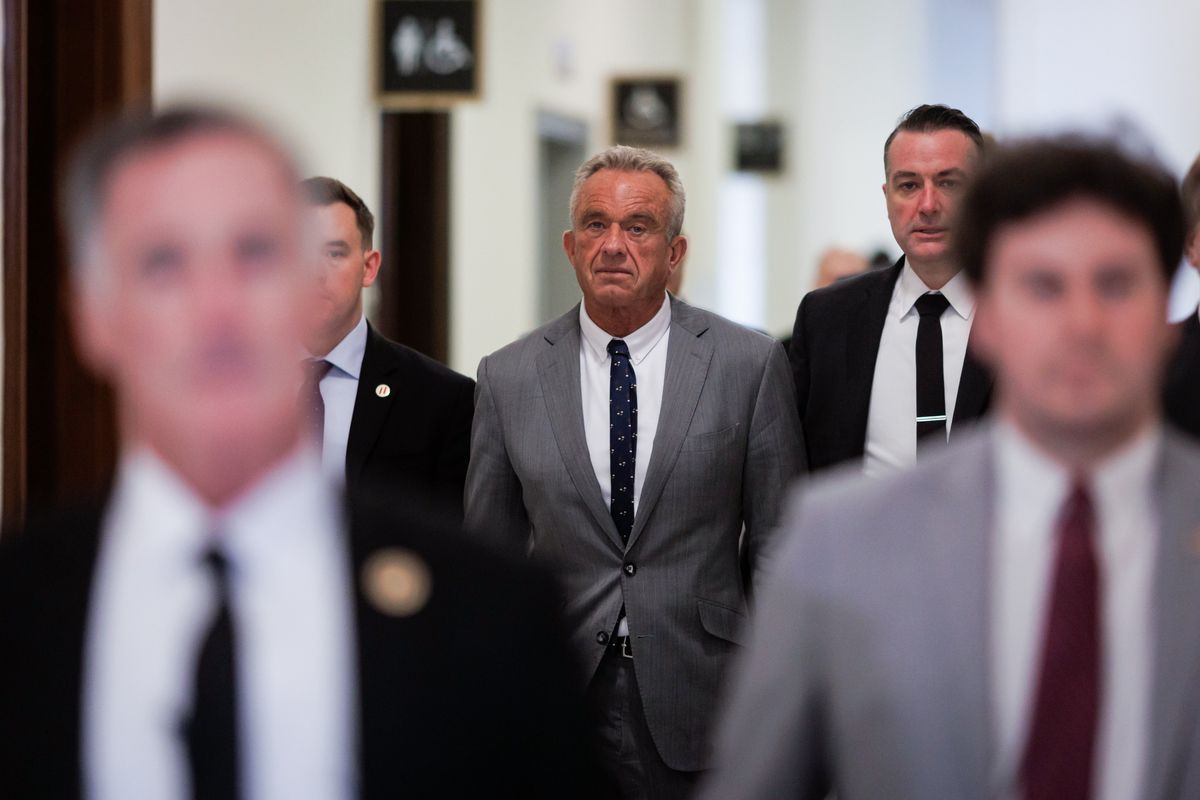RFK Jr. faces blistering questions on vaccines, abortion from Democrats
Robert F. Kennedy Jr., President Donald Trump’s nominee for Secretary of Health and Human Services, testifies during his Senate Finance Committee confirmation hearing at the Dirksen Senate Office Building on Wednesday in Washington, D.C. (Win McNamee)
Robert F. Kennedy Jr. faced a divided panel of senators Wednesday, with Democrats deeply critical of the vaccine skeptic’s bid to serve as America’s top health official, and Republicans insisting that the former liberal was the right choice to lead a nearly $2 trillion agency that helps shape everyday life.
Democrats blistered Kennedy with questions that he struggled to answer, such as whether he stood by his most controversial claims appearing on podcasts and in books and interviews, and how he would oversee the Department of Health and Human Services if confirmed as its secretary. They pushed him to defend his shifting stance on abortion and whether he would simply rubber-stamp President Donald Trump’s agenda, or if he would use his perch to continue raising doubts about vaccines – often quoting Kennedy’s own words back at him.
“Unlike other jobs that we’re confirming around this place, this is a job where it is life and death,” said Sen. Michael Bennet, D-Colo., after asking Kennedy whether he had said the coronavirus pandemic may have been a genetically engineered bioweapon. “It’s too important for the games that you’re playing, Mr. Kennedy.”
Republicans countered that Kennedy, a former environmental lawyer who led an anti-vaccine organization, had reassured them of his qualifications and tried to keep the focus on America’s high rate of chronic disease, which Kennedy has vowed to bring down. Several praised him as a would-be reformer, insisting that Kennedy was asking difficult questions about the nature of health care industry conflicts – and suffering a political beating in response.
“I think I know the personal and political price you paid for this decision,” said Sen. Ron Johnson, R-Wis., a staunch supporter of Kennedy.
Sen. Roger Marshall, R-Kan., a physician, invoked his faith when praising Kennedy.
“I think that you are the person to lead HHS to make America healthy again, and God has a divine purpose for you,” Marshall said.
The packed confirmation hearing in front of the Senate’s finance panel often devolved into a heated, sometimes circuslike atmosphere during which several anti-Kennedy protesters were forcibly removed by Capitol Police. Prominent Kennedy supporters such as popular podcaster Megyn Kelly and anti-vaccine activist Del Bigtree attended in a show of support; physicians in white coats, who warned reporters that Kennedy would be a public health menace, sat next to attendees wearing pro-Kennedy messages.
There has never been a health secretary like Kennedy – and if Senate Democrats get their way, there won’t be. If confirmed, the longtime anti-vaccine activist would oversee the nation’s vaccine supply. The avowed critic of agencies such as the Food and Drug Administration would be empowered to remake them.
Kennedy insisted to lawmakers that he is not anti-vaccine – a claim that many Democrats rejected, invoking Kennedy’s own words. A Washington Post review identified dozens of times in recent years in which Kennedy disparaged vaccines, such as his claims that vaccines “poisoned an entire generation of American children” and that doctors have “butchered all these children” by administering shots recommended by federal authorities.
Kennedy also pledged that he would support the President’s Emergency Plan for AIDS Relief, known as PEPFAR, which is facing pressure from the Trump administration. The two-decade-old program funds global HIV testing and treatment and has been credited with saving more than 25 million lives but has been recently bound up in America’s abortion politics, with Republicans calling to overhaul it. PEPFAR was paused amid the Trump administration’s broad freeze on foreign aid.
If Kennedy does not win support from any Democrats, he can afford to lose only three Republican votes in the closely divided Senate, where he needs 50 votes to be confirmed. He has spent more than a month meeting with dozens of senators, seeking to sway them, although it is not clear whether those efforts secured additional votes or further antagonized skeptics. Sen. Patty Murray, D-Wash., a prominent Kennedy critic, told the Post last week that it was the most troubling meeting she has had with a Cabinet nominee in her three-decade Senate career.
Sen. Sheldon Whitehouse, D-Rhode Island – Kennedy’s former law school roommate and watched as a potential swing vote – tried to extract promises from Kennedy, including a pledge to “never say that vaccines aren’t medically safe when they, in fact, are.”
“Frankly, you frighten people,” Whitehouse told his former friend.
Kennedy told senators he had been dismissed as a conspiracy theorist because he was challenging the status quo, and some Republicans sought to defend him. Sen. Steve Daines, R-Mont., noted three GOP doctors sit on the panel and touted his own bona fides as a chemical engineer.
“We believe in science. I’m thankful that you do, too,” Daines said.
The Senate finance panel will weigh whether to advance Kennedy’s nomination to the full Senate for a vote. Kennedy will face the Senate health committee Thursday, in what is likely to be another contentious hearing, although that appearance is considered a courtesy and the panel does not have the power to advance his nomination.
About the only point attendees agreed on: The U.S. health system is in trouble. Americans are dying earlier than people abroad, several lawmakers noted, and chronic disease is an overlooked problem.
“We’re at a turning point,” said Sen. Ron Wyden, D-Ore., the panel’s top Democrat, adding that Americans feel disillusioned about the state of the system.
Kennedy also invoked the stakes, insisting that his career was guided by a singular goal to improve public health.
“The first thing I’ve done every morning for the past 20 years is to get on my knees and pray to God that he would put me in a position to end the chronic disease epidemic and to help America’s children,” Kennedy said.
Ahead of the hearing, advocates and Democrats arrayed outside the Capitol, calling attention to Kennedy’s visit to Samoa to meet with anti-vaccine activists in 2019, several months before the island nation was rocked by measles, a vaccine-preventable disease. Hawaii Gov. Josh Green (D) returned to Washington to again share his story of responding to Samoa’s outbreak, calling it a disturbing preview of what could befall America if vaccine skepticism takes hold.
Several of Kennedy’s family members spoke out on the eve of the hearing. His cousin, Caroline Kennedy, on Tuesday called him a “predator” and urged the Senate to reject him. Kennedy’s niece, Kerry Kennedy Meltzer, shared private emails from him with reporters in a bid to stop his confirmation.
Meanwhile, Kennedy’s supporters lined the halls of Congress and sat behind him in the hearing room.
Nicole Shanahan, who was Kennedy’s running mate during his failed independent presidential campaign last year and reportedly has a personal fortune that exceeds $1 billion, on Tuesday vowed to fund challengers to senators who refused to vote for Kennedy.
Kennedy struggled to grasp some of the details of issues that would fall within his potential purview. He asserted that most Americans don’t like the Affordable Care Act and would prefer to be on private insurance. But recent polls show that more than 60% of Americans approve of the ACA, and more than 24 million people recently used the health law’s insurance marketplace to purchase private health coverage. He claimed that Americans were unhappy with the cost of Medicaid’s insurance premiums – seeming to confuse the program, which covers low-income Americans and only rarely includes premiums, with Medicare, which covers older Americans and does include premiums.
He also punted on some of the biggest questions that could define his tenure.
Pressed by Sen. Catherine Cortez Masto (D-Nevada) on whether federal emergency health law preempts state abortion bans if a woman needs an emergency abortion – a major debate in health policy that reached the Supreme Court last year – Kennedy was at a loss.
“I don’t know. I mean the answer to that is, I don’t know,” Kennedy responded. Under the Biden administration, HHS adopted the position that the federal law took precedence and investigated hospitals that refused to provide emergency abortions.
Sen. Bill Cassidy, R-La., a physician and closely watched swing vote, peppered Kennedy on how to better integrate the Medicare and Medicaid programs, which have been targeted by Republicans for potential spending cuts.
“I do not know the answer to that,” Kennedy replied.
Several senators pressed Kennedy on whether he stood by his years of support for abortion, having pledged during his presidential campaign that he would protect it – or had truly embraced Republicans’ goal to restrict access to the procedure as he has said more recently.
“I have never seen any major politician flip on that issue quite as quickly as you did when Trump asked you to become HHS secretary,” Sen. Bernie Sanders (I-Vermont) told Kennedy.
“I’ve always believed that every abortion is a tragedy,” Kennedy responded, echoing Trump’s position.
It was not immediately clear if the hearing helped or hurt Kennedy’s confirmation prospects. Sen. John Fetterman (D-Pennsylvania), eyed as a potential swing vote, said what he gathered about Kennedy’s performance was “not great.”
“He has said a lot of controversial things,” said Fetterman, who does not sit on the Senate finance panel. “And they invented this thing called the internet and you can easily refer to them.”
The hearing was moved from the Senate finance panel’s usual hearing room because of the significant public interest.
It also featured its share of surreal moments. Sanders displayed outfits for children sold by Children’s Health Defense, an anti-vaccine organization founded by Kennedy, that were emblazoned with the message “Unvaxxed Unafraid.”
“Are you supportive of these onesies?” Sanders thundered at Kennedy.

